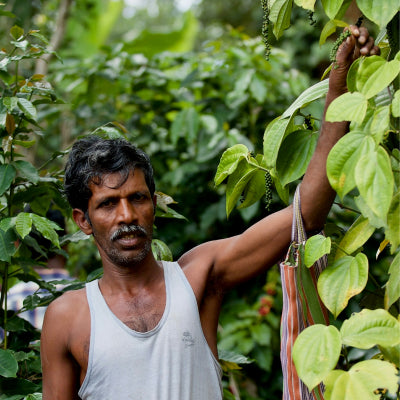
How Climate Change is Reshaping Indonesia's Coffee Industry
Share

Indonesia, known as one of the world’s largest coffee producers, is celebrated for its rich, diverse coffee varieties like Arabica and Robusta. Coffee has long been a cultural staple and a significant export for the country. However, climate change is presenting new and formidable challenges to Indonesia’s coffee industry, impacting both the cultivation areas and the quality of the beans. As temperatures rise and weather patterns become more unpredictable, coffee farmers are faced with the urgent need to adapt.
Climate Change Effects on Coffee Cultivation
The changing climate is already affecting where coffee can be grown. For Arabica beans, which require cooler temperatures, the suitable cultivation areas are shifting to higher altitudes. This phenomenon, while creating new opportunities at higher elevations, means that lower-lying areas—once optimal for coffee farming—are becoming less viable. By 2050, it’s projected that Indonesia will lose over half of its suitable land for Arabica cultivation. However, 28% of new, higher-altitude areas will become suitable, offering some hope for farmers willing to adapt.
Both Arabica and Robusta beans are vulnerable to shifts in temperature and precipitation. Arabica, in particular, thrives at temperatures between 15 and 24°C, and rising temperatures are already pushing many coffee farms beyond this threshold. Robusta, while more tolerant of higher temperatures, is still affected by the increasing unpredictability of rainfall and humidity levels.
Learn more about Ruang Kopi's mission and values on their About Us page.
Impact on Coffee Yield and Quality
Coffee plants are extremely sensitive to changes in the environment. Warmer temperatures and erratic rainfall can delay the flowering process, directly affecting coffee yields. Prolonged droughts and sudden downpours disrupt the delicate balance that coffee plants need to thrive, often leading to reduced quality and quantity.
In addition to weather patterns, climate change is also aiding the spread of coffee pests, such as the coffee berry borer, which thrives in warmer conditions. As these pests expand into new regions, they bring added pressure to coffee farms, often degrading the overall health of crops.
Mitigation Strategies in Coffee Farming
To combat the growing challenges posed by climate change, Indonesian coffee farmers are adopting various mitigation strategies aimed at protecting their crops. One effective approach is the use of shade plantations, where trees are planted alongside coffee crops to shield them from direct sunlight and reduce temperature fluctuations. This technique not only helps in controlling temperatures but also protects the soil from erosion during heavy rains.
Farmers are also turning to irrigation systems to ensure a stable water supply during droughts. Another locally popular solution is the use of Rorak, or dead-end trenches, whichhelp conserve water during the dry season by capturing rainwater and allowing it to infiltrate the soil slowly.
In addition to traditional adaptation methods, some coffee-growing communities are also exploring renewable energy solutions. Solar-powered initiatives, such as those promoted by local organizations like Solar Chapter, aim to improve infrastructure and provide consistent power sources for coffee processing and water management.
Future Outlook for Indonesian CoffeeLooking to the future, it’s clear that adaptation will be key to the survival of Indonesia’s coffee industry. Sustainable farming practices, such as using modified cultivation calendars based on climate predictions, will play a critical role in ensuring that farmers can continue to produce coffee in increasingly hostile environments.
Although Arabica’s growing areas are shrinking, Robusta’s range is expanding, providing some relief. Nevertheless, farmers must be supported with the necessary knowledge, resources, and technology to adapt to these changes. Renewable energy programs, like those supported by Solar Chapter, offer farmers a way to improve their infrastructure without increasing their environmental footprint. By integrating solar energy, farmers can better manage water resources and ensure more efficient coffee processing, contributing to the long-term sustainability of coffee farming.
For coffee lovers seeking the best of Indonesia’s offerings, Ruang Kopi provides access to expertly roasted, single-origin varieties like Bali Blue Moon and Flores Wolo Bobo, which capture the unique flavors of Indonesia’s diverse regions.
Climate change poses a significant threat to the future of coffee production in Indonesia. With rising temperatures, unpredictable weather patterns, and increasing pest populations, the challenges are undeniable. However, adaptive strategies—ranging from shade-grown coffee to renewable energy solutions—offer hope. By combining traditional techniques with innovative approaches like solar power, Indonesian farmers can continue to produce world-class coffee while minimizing the impacts of a changing climate.
As consumers, supporting sustainable coffee brands not only means enjoying a superior cup of coffee but also directly contributing to the livelihood of farmers working to adapt in the face of climate change. In choosing these products, we help to preserve the heritage of Indonesian coffee and ensure a future where coffee farming can thrive.
For those looking to regularly enjoy sustainable, freshly roasted coffee, check out Ruang Kopi’s subscription service, offering a seamless way to indulge in premium coffee while supporting environmental initiatives.
Explore more about the unique journey of Indonesian coffee in this detailed blog post.